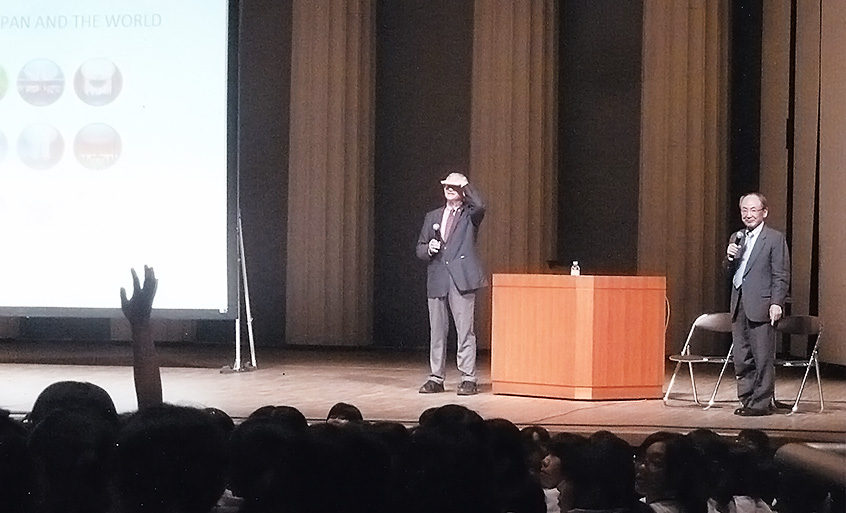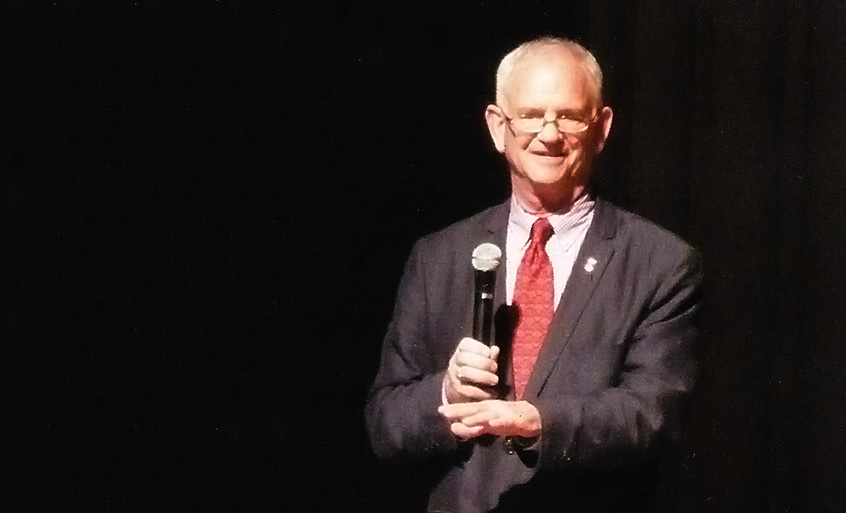This article is written by Dr. Yoshio Murakami, a regular member of TUJ Board of Overseers, an advisor to the International New York Times (Asian edition) in Japan and former Board Director of Asahi Shimbun.
By 2:30 p.m. on July 22, 2016, Okayama Citizen’s Hall located in the center of the city was filled with over 700 Okayama Asahi Senior High School students. It is the best public high school in Okayama Prefecture, sending many graduates to top universities in Japan.
The occasion was the lecture given by the dean of an American university’s Japan campus for the first time in the prefecture to high school students on subjects of great interest to them such as why they need to become global citizens, how best to do it, and what are differences in higher education between Japan and the United States.
At 3:00 p.m., the event began with an introduction of TUJ Dean Bruce Stronach. Warm applause echoed throughout the hall. 700 students filled the first floor, and teachers and parents were seated on the second floor. Dean Stronach began by praising the students’ high caliber and by reminding them that they were the human resources for the future of Japan.
Then the dean started with a serious analysis of Japan by pointing out that the way Japan was moving, it could not survive as a major player in the world. He also stressed the way Japan’s demography was pointing, it could not expect to have a strong economy in the future due to its shrinking workforce. Dean Stronach elaborated on these challenges in a historical context, as well as on current trends in this country. For example, it is perfectly fine for the Japanese to be proud of their traditions and culture, but there exists some thinking that Japanese culture is superior to some others. Is it a question of superiority or inferiority? Isn’t it only the difference? “I believe it is very important to recognize the difference, and appreciate it,” the dean stressed. To become a global person means to recognize the many differences in the world.
In order to develop such an attitude and thinking, what should we try to learn and practice? Dean Stronach listed the following five elements: Language (言語), Experience (経験), Confidence (自信), Desire (熱意), and Understanding (理解).
He then explained these were the things American higher education tried to develop in the form of Liberal Arts. Liberal Arts education, he stressed, happens not only in classroom lectures. A lot of education is being done outside of the classroom. Not only that, he explained that Liberal Arts education continues after graduating from a university, and on for the rest of one’s life. The value of this education is measured not by the academic marks at school, but by the enrichment of one’s life.
During the course of explaining the American educational system, the dean explained that Japanese college students study fewer hours per week than American students. And the ratio of the U.S. college students who work over 20 hours per week is far higher than their Japanese counterparts. When charts showing this were shown, there was a deep sigh from all the students.
For most of the students who would be going to college or university in a year or two, it appeared a very stimulating lecture. Dean Stronach expressed his hope that his audience would get something out of his lecture and that they would become global citizens for the future of Japan.

During the brief Q & A session, six students asked questions. Questions were about how to study the language, why U.S. students had so much time for their own studies and experiences outside the classroom, and how to go study in a foreign country. After the lecture, many students were saying they learned many ideas they had never thought of before. One student told me that he would start thinking in a more global frame of mind.
About this Event:
An alumni group of this high school, headed by Mr. Muneharu Kurozumi, organized this event. They make regular contributions to their alma mater. Yoshio Murakami, a member of the Temple University, Japan Campus Board of Overseers, happens to be his classmate, and asked the Dean to travel to Okayama and talk to the students. The alumni group and the school were delighted to hear the dean. This event was reported in the Entire Prefectural Section of the influential Sanyo Shimbun with a photo.

